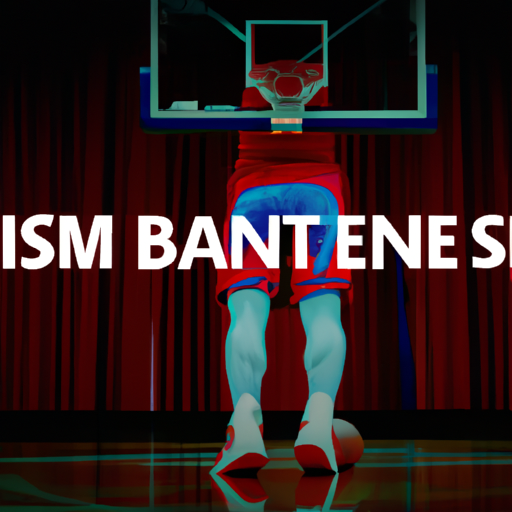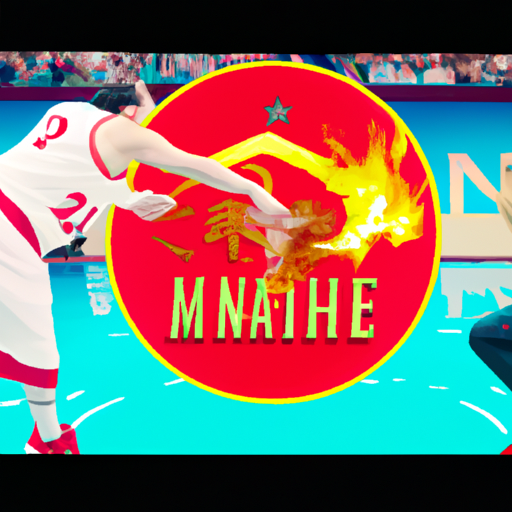Ron DeSantis: “NBA took a break from … bending the knee to Communist China”

Ron DeSantis’s stance on the NBA and its relationship with Communist China
Ron DeSantis, the Governor of Florida, recently made headlines with his strong stance on the NBA and its relationship with Communist China. In a press conference, DeSantis criticized the NBA for what he perceived as a lack of consistency in their approach to social justice issues. He accused the league of being quick to condemn American values while turning a blind eye to the human rights abuses committed by the Chinese government.
DeSantis began his remarks by acknowledging the NBA’s efforts to promote social justice within the United States. He commended players and teams for using their platform to raise awareness about important issues such as racial inequality and police brutality. However, he argued that the league’s silence on China’s human rights violations was hypocritical and undermined their credibility.
The Governor pointed out that the NBA has been vocal in its support for causes such as Black Lives Matter, even going so far as to allow players to wear social justice messages on their jerseys. However, when it comes to China, the league seems to have a different set of standards. DeSantis highlighted the fact that the NBA has lucrative business partnerships with Chinese companies and has even played exhibition games in the country.
DeSantis accused the NBA of prioritizing profits over principles. He argued that the league’s financial interests in China have led them to turn a blind eye to the Chinese government’s oppressive actions, such as the treatment of Uighur Muslims in Xinjiang and the crackdown on pro-democracy protesters in Hong Kong. He criticized the NBA for failing to use its influence to advocate for human rights and democracy in China, despite its claims of being a socially conscious organization.
The Governor also took aim at individual players and coaches who have been outspoken on social justice issues in the United States but have remained silent on China. He questioned their commitment to the principles they claim to stand for and suggested that their silence was driven by financial considerations. DeSantis argued that if the NBA truly wants to be a force for positive change, it must be consistent in its advocacy for human rights, both at home and abroad.
DeSantis’s remarks drew both support and criticism. Some applauded his willingness to call out the NBA for what they saw as a double standard, while others accused him of using the issue for political gain. Regardless of one’s opinion on the matter, it is clear that DeSantis’s comments have sparked a broader conversation about the NBA’s relationship with China and the role of professional sports in promoting social justice.
In conclusion, Ron DeSantis’s criticism of the NBA’s relationship with Communist China has brought attention to what he perceives as a lack of consistency in the league’s approach to social justice issues. He argues that the NBA’s silence on China’s human rights abuses undermines their credibility and calls into question their commitment to the principles they claim to stand for. Whether or not one agrees with DeSantis’s stance, his remarks have ignited a larger debate about the role of professional sports in advocating for human rights and democracy.
The impact of the NBA’s break from bending the knee to Communist China on Ron DeSantis

Ron DeSantis, the Governor of Florida, recently made headlines with his statement about the NBA taking a break from “bending the knee to Communist China.” This remark has sparked a debate about the impact of the NBA’s stance on China and how it affects politicians like DeSantis.
The NBA has been under scrutiny for its relationship with China for quite some time. The league has a significant presence in the Chinese market, and many players and teams have lucrative endorsement deals with Chinese companies. However, this relationship has come at a cost, as the NBA has been accused of prioritizing financial gain over human rights concerns in China.
DeSantis, known for his conservative views, has been a vocal critic of the NBA’s relationship with China. He believes that the league’s willingness to overlook China’s human rights abuses is hypocritical, especially considering the NBA’s outspokenness on social justice issues in the United States. In his statement, DeSantis suggests that the NBA’s break from bending the knee to Communist China is a step in the right direction.
The impact of the NBA’s break from bending the knee to Communist China on DeSantis is twofold. Firstly, it aligns with his political ideology and strengthens his position as a critic of the league’s relationship with China. By highlighting the NBA’s shift in stance, DeSantis can further emphasize his own commitment to standing up against China’s human rights abuses.
Secondly, DeSantis’s statement serves as a rallying cry for his conservative base. Many conservatives have been critical of the NBA’s perceived hypocrisy, and DeSantis’s remarks resonate with those who believe that the league should prioritize American values over financial gain. By speaking out against the NBA’s relationship with China, DeSantis is tapping into a sentiment that is shared by many conservatives across the country.
However, it is important to note that DeSantis’s statement is not without controversy. Some argue that his remarks are politically motivated and aimed at gaining support from his conservative base. They claim that DeSantis is using the NBA’s relationship with China as a way to score political points and divert attention from other pressing issues.
Furthermore, critics argue that DeSantis’s focus on the NBA’s relationship with China is a distraction from his own handling of important issues in Florida. They claim that he should be more focused on addressing the state’s healthcare system, education, and environmental concerns, rather than commenting on the NBA’s business dealings.
In conclusion, Ron DeSantis’s statement about the NBA taking a break from bending the knee to Communist China has sparked a debate about the impact of the league’s relationship with China on politicians like DeSantis. While his remarks align with his political ideology and resonate with his conservative base, they are not without controversy. Critics argue that DeSantis’s focus on the NBA’s relationship with China is a distraction from more pressing issues in Florida. Ultimately, the impact of the NBA’s break from bending the knee to Communist China on DeSantis remains to be seen, but it has certainly ignited a discussion about the intersection of sports, politics, and human rights.
Analyzing Ron DeSantis’s views on the NBA’s political involvement
Ron DeSantis, the Republican Governor of Florida, recently made headlines with his comments about the NBA’s political involvement. During a press conference, DeSantis criticized the NBA for what he perceived as a lack of consistency in their political stances. He accused the league of taking a break from “bending the knee to Communist China” and questioned their commitment to social justice causes.
DeSantis’s comments came in response to the NBA’s decision to suspend games in protest of the shooting of Jacob Blake, a black man, by a police officer in Kenosha, Wisconsin. The league’s players and coaches had been vocal in their support of the Black Lives Matter movement and had used their platform to raise awareness about racial injustice. However, DeSantis argued that the NBA’s actions were hypocritical, pointing out that the league had not taken a similar stand against China’s human rights abuses.
The Governor’s criticism of the NBA’s political involvement is not without merit. The league has faced scrutiny in the past for its relationship with China, a country known for its oppressive regime and disregard for human rights. In 2019, the NBA found itself embroiled in controversy when Houston Rockets General Manager Daryl Morey tweeted in support of the pro-democracy protests in Hong Kong. The league faced backlash from China, which resulted in the cancellation of several preseason games and a strain in the NBA’s business ties with the country.
DeSantis’s comments reflect a broader concern among some conservatives about the NBA’s perceived political bias. They argue that the league has become too focused on social justice issues and has neglected its primary purpose of providing entertainment. Critics also accuse the NBA of being selective in its activism, choosing to speak out on issues that align with liberal values while remaining silent on others.
However, it is important to note that the NBA’s players and coaches have the right to express their opinions and use their platform to advocate for social change. The league has a long history of players using their influence to address social issues, from Kareem Abdul-Jabbar’s activism during the civil rights movement to LeBron James’s efforts to combat voter suppression. The NBA has also been at the forefront of promoting diversity and inclusion, with initiatives such as the NBA Foundation and the NBA Voices campaign.
While DeSantis’s criticism of the NBA’s political involvement may resonate with some, it is essential to consider the broader context. The NBA, like any other organization, is made up of individuals with their own beliefs and values. It is unrealistic to expect complete unanimity among players and coaches on every political issue. The league’s decision to suspend games in protest of the shooting of Jacob Blake reflects the players’ desire to use their platform to raise awareness about racial injustice, a cause that is important to them.
In conclusion, Ron DeSantis’s comments about the NBA’s political involvement highlight a broader debate about the role of sports in society. While some may agree with his criticism of the league’s perceived inconsistency, it is crucial to recognize the NBA’s players’ right to express their opinions and advocate for social change. The NBA has a long history of activism and has used its platform to address important social issues. Ultimately, the NBA’s political involvement should be seen as a reflection of the players’ commitment to making a positive impact on society.

